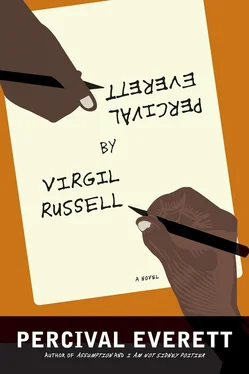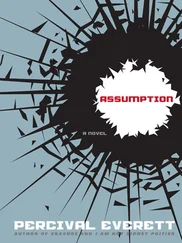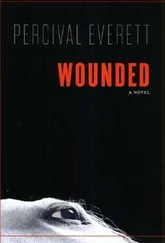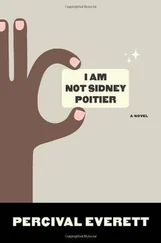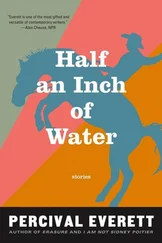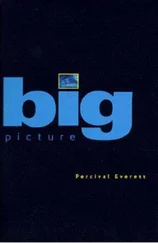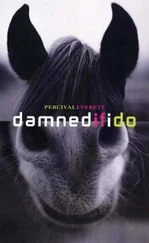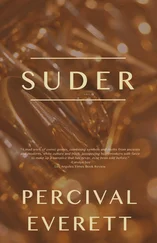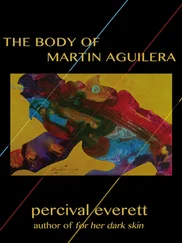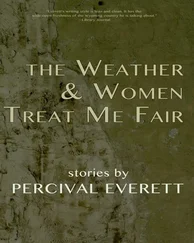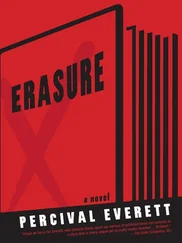Still, in spite of what I thought was rather barefaced and transparent, the fact of it was so incredible as to leave most, if not skeptical, then befuddled. I chose, quite reasonably, not to imagine the liaison and preferred to call it, in the privacy of my own head, though I did not consider it for any length of time, a bit of extracurricular activity. Of course, at their ages anything but using the toilet and going about the business of dying was extracurricular. If anyone had given Maria a cigarette, she would have smoked it happily. And I felt happy for her. And for him, however grudgingly. The two had just come wobbling and strutting, respectively, into my kitchen. Mrs. Klink was already seated with me, nursing her ubiquitous cup of green tea.
What’s wrong with the two of you? Mrs. Klink asked.
Nothing, nothing at all, said Sheldon Cohen.
Maria Cortez giggled, maybe chortled; I have never known the difference. She sat next to Mrs. Klink and stared out into my living room.
Emily Kuratowski was still in the hospital but was scheduled to return to us the next day.
Emily does not look well, said Mrs. Klink.
She’s ninety-nine, I said.
She looks beautiful. She’s a hottie, said Sheldon Cohen.
To a considerable degree, by the time we have reached a certain age, it varies for each of us, we have said all we meant to say. Everything else is either a reissue or an elucidation, a gloss. Some utterances might be reconstructions of some erased pages, palimpsests of sorts, but it’s mere repetition. There might even be supplement here or there, but our questions will have nothing more to seek but the texture of our texts, the colors of our recollections, but there will be no new colors and there will be no new tastes or sensations. The only new thing will be cessation, suspension, conclusion, and besides that we will have nothing to play with but the play within the shadows of whatever metaphors loom or we choose to have loom.
So there really was nothing for Sheldon and Maria to say and they said it. And so did Mrs. Klink in asking her question and so did I by sitting there and remembering the dream that I had, wondering if it was a memory.
In the dream I was back in the break room of the orderlies, the stolen keys already in my pocket, and I was hidden in the shadows of the lockers. I looked to the window that would be my escape and listened to the sickening huffing and panting of Harley and Caledonia or Clarabelle or Cissy or whatever I had decided to call her and on that same wall was a door, an old-fashioned wooden door that did not seem in keeping with the vintage or style of the building or any building on the campus. In my pocket was the old key. I had not placed it back on the ring with the others before leaving them to be recovered and it now occurred to me that this key might be important, that this key might be key. But the really strange thing about the door was that there was no corresponding door on the outside of that wall. I looked at the faces of my friends. They did not know that I was ever in the orderlies’ break room. They knew only that Billy and I had somehow come to have possession of the keys that had caused us all so much trouble. I would tell them about the door. What would it mean to them? What did it mean to me? I was not sure I had even seen the strange door I thought I recalled.
Deep, long past halfway, into the journey of my so-called life, I found myself in darkness, without you and you and you and you, a whole list of you, and stuck on this crooked trail, the straight one having been lost, and it is difficult to express how in this darkness, rough and stern, as bitter as death, but what I saw, what I saw there, out of slumber and wide-awake in that dark place, was the termination of some world and the beginning of another, a mountain maybe, a wind pressing against me, issued from some sea I could not see, and so I fled onward, thinking how lucky are the amnesiacs, when a panther addressed my presence and then a lion and then a love long lost, all three heads uplifted, but the last of them, she brought upon me much sadness, the kind that comes with fear, and she wept with me despite her hunger and we were cast back into some light, away from the cats, and I met a man whose silence was well practiced and he recited to me his lineage and I did not care and he told me he was a poet and about that I cared even less and he told me he would travel with me and then I was impressed. Who will be my Virgilius now?
This was how I thought as I dragged my sorry ass across that lawn, toward that wall, to that window and back to the orderlies’ smoke-sour break room.
38
Sometimes stories come and stop and go
Sometimes stories stop and go and go
Sometimes stories come and stop and come
Sometimes stories stop and stop and stop
Sometimes stories come and come and go
Sometimes Sometimes Sometimes come
Swing an ax at my head, brother Billy, brother Billy
Swing an ax at my head, brother Billy mine
Swing an ax at my head, brother Billy, brother kill me
Swing an ax at my head for I haven’t got the time.
A pistol in the first act and all of that. I could hear the plaintive cries of juvenile crows most of the time in that late summer. I wondered when the cries would mature. Would they one morning be the sounds of adult crows or would the change come in the middle of the caw? Would that adult sound be approached? There it is, there it is, almost, almost there, ahhhh, there it is. However it is, so it is with age. And when do two things that are in fact the same thing converge and negate any notion of their ever having been anything but one thing? When does Cicero become Tully? When does the morning star become the evening star? When does nobody in particular become nobody at all?
If I am to create you, me, them, or you create me, you, them, then you or I have to do something to allow that making, so that there is making, making, almost there, made. As long as an individual is traced out only in repose, in some milieu, its, his, her critical qualities and essential attributes can only be stated but not created. A lesson I learned from god in that story about the first and loveliest, and no doubt overly tended, garden. It was one thing to have A and E (possibly universal and existential statements, respectively) lying about, but finally somebody’s got to fuck up or fuck somebody or fuck the wrong somebody. Then you’ve got yourself a story. Then you’ve got yourself a world.
This whole business of making a story, a story at all, well, it’s the edge of something, isn’t it? Forth and back and back and forth, it’s a constant shuttle movement, ostensibly looking to comply with some logic, someone’s logic, my logic, law, but subverting it the entire time. Like a good little wog. But, eh, don’t listen to an old man. I’m firing semantic blanks or, at least, filling them in. My son would laugh right about here. Or I would. Why do anything? That’s what I keep asking and then I remember I said to my son, or he said to me, that it’s not what you’ve made that will give you peace, that the only thing you get to take with you is having made it. Blah, blah, blah.
Sometimes I think about these things and I am taken back to my childhood. I perceived much of it as boring or painful, but that is growing up, isn’t it? I spent most of my time attempting to pass beneath the worrying radar of my mother. True that one cannot complain about such worry in any concrete way, but it was annoying and, more often than not I feared, a function of her narcissism rather than any real selflessness. Photographs of me then show a youth with red, tired eyes, not quite sullen but numbed eyes, perhaps. Boredom was my worst enemy, but not the kind that sprang from idleness, as I read and wrote quite a bit, but from a nagging lack of engagement with the world outside my thoughts, stricken every day by a tenacious noonday devil who would whisper from my shoulder that I should return to the sad, torpid world, as if I was some hermit who had left it. I ignored the devil then because he seemed too poorly informed and dressed; I had never been allowed to actually join the world. But then I did, first by climbing into it, then by walking into it until it was over my head and lungs, and a world with the world turned out to be as boring as a world without, only with more embarrassing moments and better jokes. The world seemed to me suited to people who smoked cigarettes, for they appeared to create their own weather.
Читать дальше
